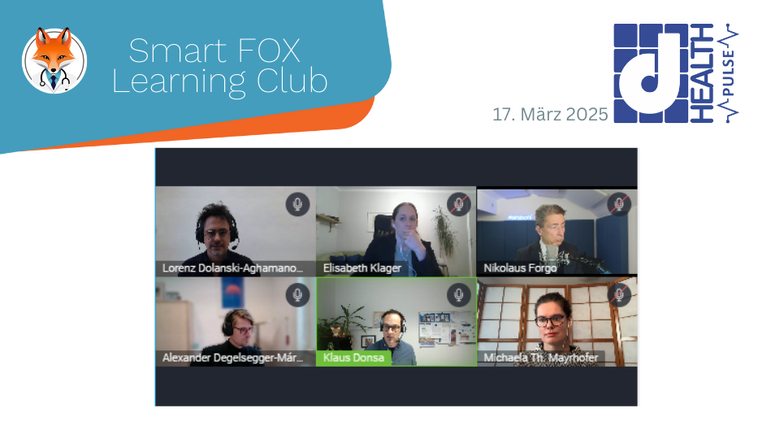
As part of the Smart FOX research project, a total of six Learning Clubs will take place over the course of the project. Project partners will present and explain issues and topics relevant to the project at the Learning Clubs. The focus is on health science, legal and ethical perspectives as well as the patient’s point of view. The aim is to promote project-internal exchange, develop the framework conditions of the research project and thus provide a platform for ethical, legal, social and economic issues.
The first Smart FOX Learning Club took place on May 6, 2024 – the aim was to offer the opportunity to discuss the content of the governance and community work package within the consortium in a Q&A setting. Initially, the presentation by the Ludwig Boltzmann Institute – Digital Health and Patient Safety and Survivors Austria provided an insight into the planned involvement of patients.
Gesundheit Österreich GmbH then elaborated on the implications of the European Health Data Space for Smart FOX. As part of the first Learning Club, the UNIVIE team provided insights into data protection law, copyright aspects and the Data Governance Act. Project-related legal questions were collected in advance, which were then discussed and answered afterwards. As an output of the event, legal briefs were created to provide brief information on the legal issues.

The second Smart FOX Learning Club took place on October 9, 2024. This event focused primarily on the content of the Data Governance Framework, which was finalized in September 2024. Since this is a dynamic document that is continuously developed and supplemented with new content, collaboration within the consortium is essential for future versions of the Data Governance Framework. The event began with the LBI DHPS presenting the results of discussions on data donations within the patient advisory board.
Following this, the UNIVIE team addressed the fundamental, personal, and affected rights of data donors. After discussing limitations on the secondary use of ELGA-standardized data, as well as the directed or undirected data donation and registration as a data altruistic organization under the DGA, UNIVIE provided further insights. The GÖG then offered perspectives on the implications of the EHDS. Once again, legal briefs were prepared as a result of these exchanges to provide a concise overview of the legal framework.
The third Smart FOX Learning Club took place on February 12, 2025. As part of the workshop, participants focused on the process of (guided) data donation from both the patient and legal perspectives, and jointly explored the relevant framework conditions through discussion.
The fourth Smart FOX Learning Club took place on March 17, 2025, as part of the dHealth pulse event series. The session focused on discussing the technical and organizational infrastructures, as well as the motivations and barriers patients face in relation to data donation.
The webinar titled “Innovations for Data-Driven Health Research” was organized by Smart FOX partners AIT and Gesundheit Österreich and offered an in-depth discussion on the ethical, legal, and social challenges of data donation for medical research. Contributing experts included Günter Schreier and Klaus Donsa (AIT), Michaela Th. Mayrhofer (BBMRI-ERIC), Alexander Degelsegger-Márquez (Gesundheit Österreich), Nikolaus Forgó (University of Vienna), and Elisabeth Klager (Austrian Patient Advisory Board). The concluding panel discussion was moderated by Lorenz Dolanski-Aghamanoukjan (Gesundheit Österreich).
The webinar also featured a keynote presentation by Ms. Mayrhofer, who gave an overview of the BBMRI-ERIC Biobanks—a European research infrastructure that connects biobanks across Europe and enhances the efficiency of biomedical research through the structured and regulated exchange of data. BBMRI-ERICs operate under a special legal framework that facilitates the creation of research projects of European interest. The founding process includes joint financing and the definition of a clear research goal. Currently, there are 30 ERICs in Europe working in various research areas.
One of the central questions of the webinar was how to motivate individuals to donate their health data and what obstacles exist in this context. According to the speakers, participants often contribute to medical research primarily out of solidarity with other patients. Especially in the case of rare diseases, the altruistic hope of enabling better access to therapies and research findings for others plays a key role. The desire to improve the healthcare system in the long term and to support one’s own health is also of great importance.
Legal uncertainties and concerns about how personal health data may be used and shared are among the most frequently cited challenges, according to the speakers. In this context, the recently published European Health Data Space (EHDS) regulation was discussed. It aims to connect health data and promote data exchange across national borders.
Against this backdrop, the speakers agreed that comprehensive and detailed information about the type of data collected and its intended use is essential. The clearer the communication, the greater the willingness to participate.

The next Smart FOX Learning Club will take place on June 4, 2025.
Register for the Smart FOX newsletter and always stay up to date on the activities surrounding the project and the latest developments from the individual work packages.
